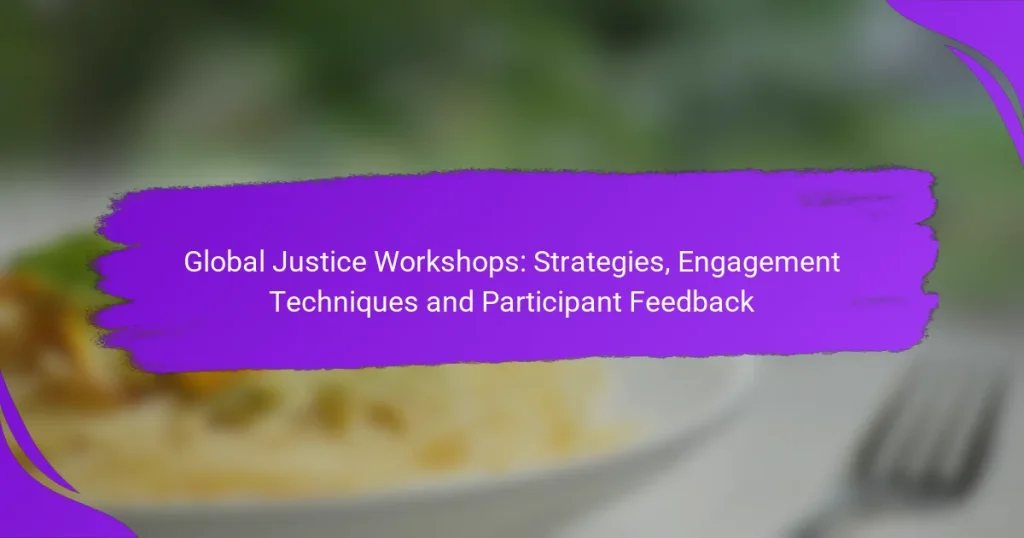Global justice workshops aim to cultivate engagement and collaboration among participants through innovative strategies and interactive techniques. By incorporating methods such as role-playing, multimedia, and facilitated discussions, facilitators can create an inclusive environment that promotes critical thinking and deeper understanding of global justice issues. Additionally, effective feedback mechanisms, including surveys and focus groups, are essential for refining future workshops and enhancing participant engagement.
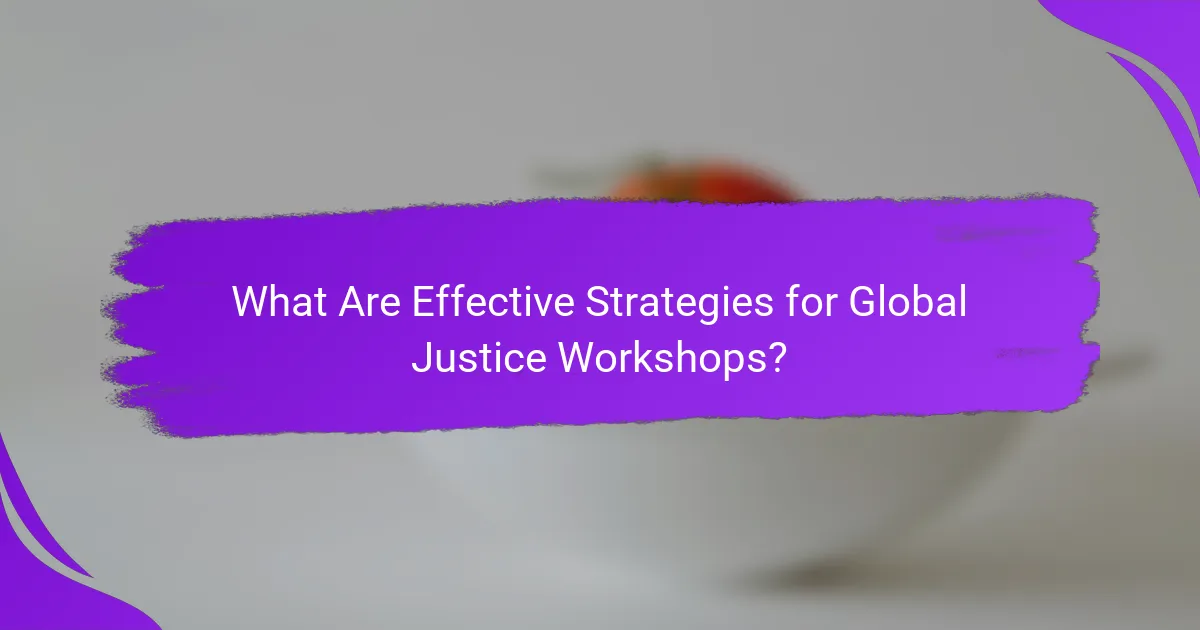
What Are Effective Strategies for Global Justice Workshops?
Effective strategies for global justice workshops focus on fostering engagement, collaboration, and critical thinking among participants. By utilizing diverse methods such as collaborative learning, role-playing, and facilitated discussions, facilitators can create an inclusive environment that encourages active participation and deeper understanding of global justice issues.
Collaborative Learning Approaches
Collaborative learning approaches emphasize teamwork and shared knowledge. Participants work together in small groups to solve problems, discuss concepts, or create projects related to global justice. This method not only enhances understanding but also builds community and trust among participants.
To implement collaborative learning, consider using techniques like group brainstorming sessions or peer teaching. Ensure that each participant has a clear role to promote accountability and engagement. Avoid dominating discussions; instead, encourage quieter members to share their insights.
Role-Playing Scenarios
Role-playing scenarios allow participants to step into the shoes of different stakeholders in global justice issues. This immersive technique helps individuals understand diverse perspectives and the complexities of real-world situations. For instance, participants might role-play as activists, policymakers, or affected communities.
To maximize the effectiveness of role-playing, provide clear instructions and context for each scenario. Debrief after the activity to discuss insights and feelings, reinforcing the learning experience. Be mindful of sensitive topics and ensure a respectful environment for all participants.
Case Study Analysis
Case study analysis involves examining real-life examples of global justice challenges and solutions. This method helps participants apply theoretical knowledge to practical situations, enhancing critical thinking and problem-solving skills. Choose case studies that are relevant and relatable to the participants’ experiences.
Encourage participants to analyze the case from multiple angles, discussing the implications of various actions taken. Consider using a structured framework for analysis, such as identifying stakeholders, challenges, and outcomes. This approach fosters deeper understanding and encourages informed discussions.
Facilitated Discussions
Facilitated discussions create a space for open dialogue about global justice topics. A skilled facilitator guides the conversation, ensuring that all voices are heard and respected. This method is particularly effective for exploring complex issues and generating diverse viewpoints.
To facilitate productive discussions, establish ground rules that promote respect and inclusivity. Use open-ended questions to stimulate conversation and encourage participants to build on each other’s ideas. Be prepared to manage conflicts or disagreements constructively, ensuring a safe environment for all participants.
Interactive Activities
Interactive activities engage participants in hands-on learning experiences related to global justice. These activities can include simulations, games, or creative projects that encourage active participation. They help reinforce concepts and make learning enjoyable.
When designing interactive activities, consider the group’s dynamics and interests. Ensure that activities are accessible and relevant to all participants. Debrief after each activity to reflect on the learning outcomes and connect them to broader global justice themes.
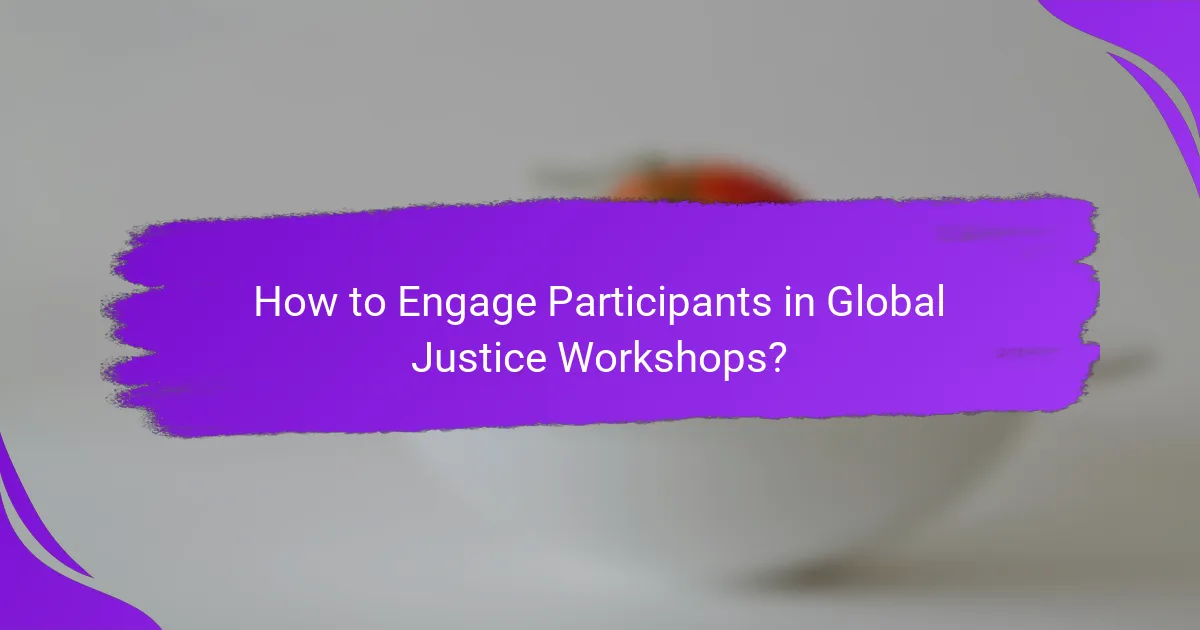
How to Engage Participants in Global Justice Workshops?
Engaging participants in global justice workshops involves using interactive methods that foster collaboration and critical thinking. Effective strategies include leveraging technology, incorporating multimedia, creating safe spaces for dialogue, and encouraging peer-to-peer learning.
Utilizing Technology Tools
Technology tools can significantly enhance participant engagement in global justice workshops. Platforms like Zoom, Miro, or Padlet allow for real-time collaboration and brainstorming, making it easier for participants to share ideas and feedback.
Consider using polling software or interactive quizzes to gauge understanding and keep participants involved. These tools can provide immediate feedback and help tailor discussions to the group’s interests and needs.
Incorporating Multimedia Resources
Multimedia resources, such as videos, podcasts, and infographics, can make complex global justice topics more accessible and engaging. By presenting information in various formats, you cater to different learning styles and keep participants interested.
For example, a short documentary on a relevant issue can spark discussion and inspire participants to share their perspectives. Ensure that multimedia content is relevant and thought-provoking to maximize its impact.
Creating Safe Spaces for Dialogue
Creating a safe space for dialogue is crucial for encouraging open and honest discussions in global justice workshops. Establish ground rules that promote respect, confidentiality, and active listening to help participants feel comfortable sharing their thoughts.
Facilitators should actively monitor the conversation and intervene if discussions become heated or disrespectful. This approach fosters a supportive environment where diverse viewpoints can be expressed and explored.
Encouraging Peer-to-Peer Learning
Peer-to-peer learning can enhance engagement by allowing participants to learn from each other’s experiences and insights. Organize small group discussions or breakout sessions where participants can share their knowledge and perspectives on global justice issues.
Consider implementing a buddy system or mentorship approach, pairing more experienced participants with those new to the topic. This not only builds relationships but also enriches the learning experience for everyone involved.
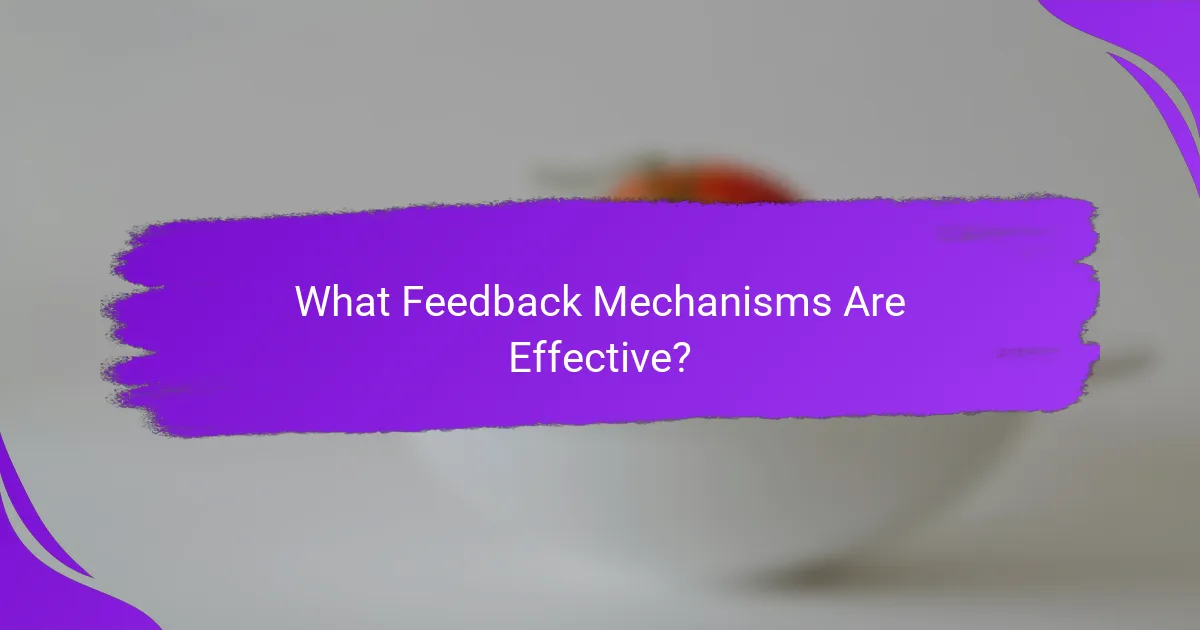
What Feedback Mechanisms Are Effective?
Effective feedback mechanisms for global justice workshops include post-workshop surveys, focus group discussions, and real-time feedback tools. These methods help gather participant insights, improve future sessions, and enhance engagement strategies.
Post-Workshop Surveys
Post-workshop surveys are a common method for collecting participant feedback. They typically include a mix of quantitative questions, like rating scales, and qualitative questions for open-ended responses. Aim to keep surveys concise, ideally under 10 questions, to encourage higher completion rates.
Consider using online survey tools like SurveyMonkey or Google Forms, which allow for easy distribution and analysis. Offering incentives, such as entry into a prize draw, can also boost response rates.
Focus Group Discussions
Focus group discussions provide an opportunity for in-depth feedback from a small group of participants. These sessions can reveal nuanced insights that surveys might miss, allowing facilitators to explore specific themes or issues in detail. Aim for groups of 6-10 participants to ensure everyone has a chance to contribute.
Prepare guiding questions in advance but remain flexible to explore emerging topics during the discussion. Recording the session (with consent) can help capture valuable insights for later analysis.
Real-Time Feedback Tools
Real-time feedback tools, such as live polls or feedback apps, allow participants to share their thoughts during the workshop. This immediate input can help facilitators adjust the session dynamically, enhancing engagement and addressing concerns as they arise.
Consider using platforms like Mentimeter or Slido, which enable anonymous responses and can be integrated into presentations. Ensure to allocate time for discussing the feedback collected in real-time to reinforce participant involvement and demonstrate responsiveness.
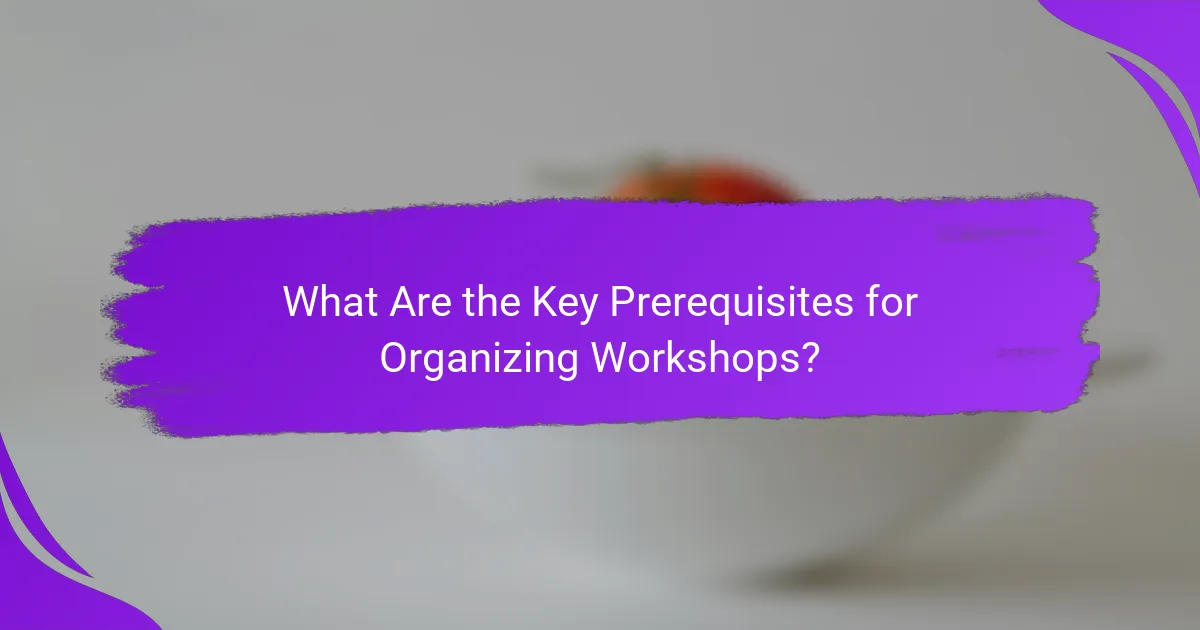
What Are the Key Prerequisites for Organizing Workshops?
Key prerequisites for organizing workshops include understanding the local context, identifying stakeholders, and setting clear objectives. These elements ensure that the workshop is relevant, engaging, and effective in achieving its goals.
Understanding Local Contexts
Understanding local contexts involves recognizing the cultural, social, and economic factors that influence participants. Each community has unique characteristics that can affect engagement and learning outcomes.
For example, consider the language spoken, prevalent issues, and local customs. Tailoring content to reflect these aspects can enhance relatability and participation.
Identifying Stakeholders
Identifying stakeholders is crucial for gathering support and ensuring diverse perspectives. Stakeholders may include community leaders, local organizations, and potential participants.
Engaging with these groups early on can help in understanding their needs and expectations. This collaboration can lead to more impactful workshops that resonate with the audience.
Setting Clear Objectives
Setting clear objectives provides direction and focus for the workshop. Objectives should be specific, measurable, achievable, relevant, and time-bound (SMART).
For instance, instead of a vague goal like “improving community engagement,” a clear objective could be “to increase participation in local events by 30% over the next six months.” This clarity helps in designing activities that align with desired outcomes.
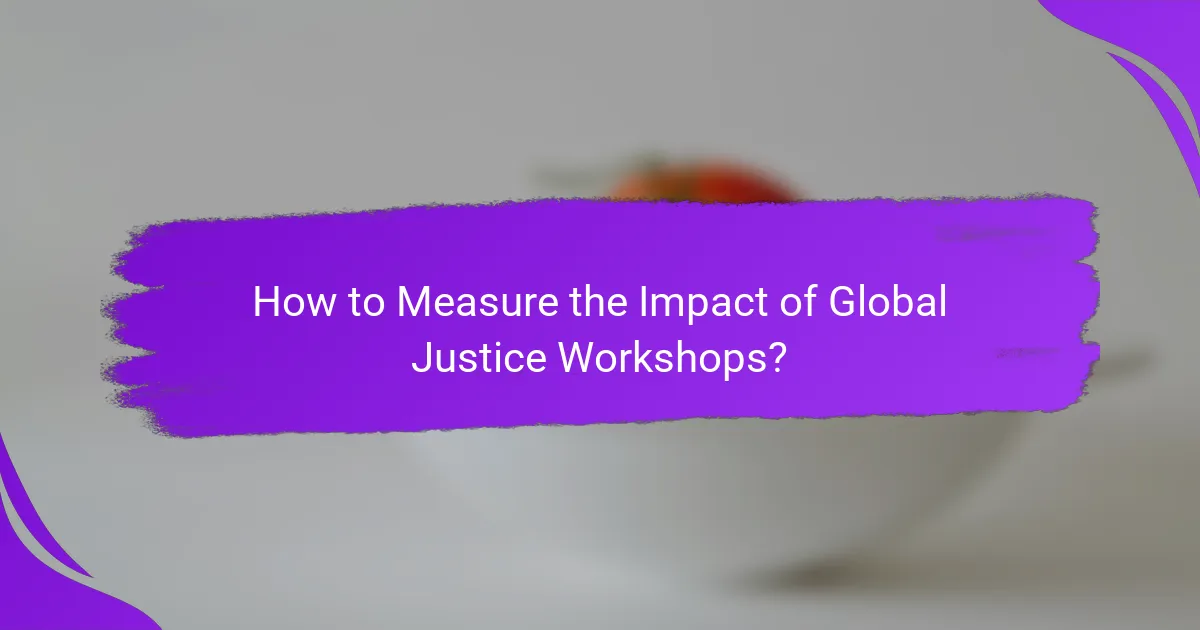
How to Measure the Impact of Global Justice Workshops?
Measuring the impact of global justice workshops involves assessing participant outcomes and conducting longitudinal studies to track changes over time. These methods provide insights into the effectiveness of the workshops and help refine future programming.
Participant Outcome Assessments
Participant outcome assessments focus on immediate feedback and changes in knowledge, attitudes, or behaviors after the workshop. Surveys and questionnaires are commonly used tools to gauge these outcomes, often employing Likert scales to quantify responses.
For effective assessments, consider including both qualitative and quantitative questions. For instance, ask participants to rate their understanding of global justice issues before and after the workshop, and include open-ended questions for personal reflections.
Longitudinal Studies
Longitudinal studies track participant progress over an extended period, providing deeper insights into the lasting effects of global justice workshops. These studies can reveal how initial learning translates into ongoing engagement and advocacy.
Implementing longitudinal studies requires careful planning, including establishing baseline data and regular follow-ups, typically over months or years. Consider using a mix of surveys and interviews to capture both numerical data and personal narratives, which can enrich the findings.
